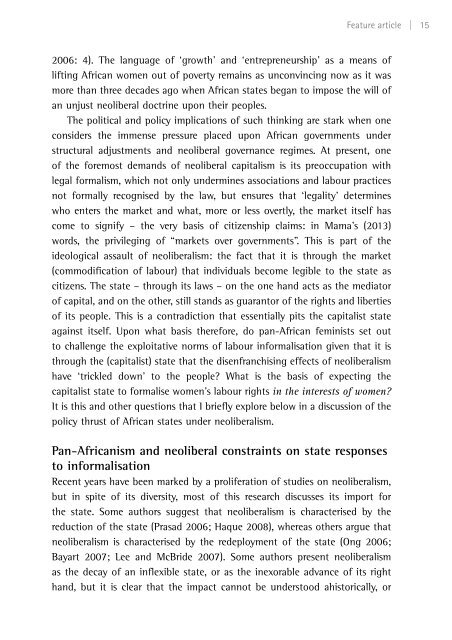You also want an ePaper? Increase the reach of your titles
YUMPU automatically turns print PDFs into web optimized ePapers that Google loves.
Feature article | 15<br />
2006: 4). The language of ‘growth’ <strong>and</strong> ‘entrepreneurship’ as a means of<br />
lifting African women out of poverty remains as unconvincing now as it was<br />
more than three decades ago when African states began to impose the will of<br />
an unjust neoliberal doctrine upon their peoples.<br />
The political <strong>and</strong> policy implications of such thinking are stark when one<br />
considers the immense pressure placed upon African governments under<br />
structural adjustments <strong>and</strong> neoliberal governance regimes. At present, one<br />
of the foremost dem<strong>and</strong>s of neoliberal capitalism is its preoccupation with<br />
legal formalism, which not only undermines associations <strong>and</strong> labour practices<br />
not formally recognised by the law, but ensures that ‘legality’ determines<br />
who enters the market <strong>and</strong> what, more or less overtly, the market itself has<br />
come to signify – the very basis of citizenship claims: in Mama’s (2013)<br />
words, the privileging of “markets over governments”. This is part of the<br />
ideological assault of neoliberalism: the fact that it is through the market<br />
(commodification of labour) that individuals become legible to the state as<br />
citizens. The state – through its laws – on the one h<strong>and</strong> acts as the mediator<br />
of capital, <strong>and</strong> on the other, still st<strong>and</strong>s as guarantor of the rights <strong>and</strong> liberties<br />
of its people. This is a contradiction that essentially pits the capitalist state<br />
against itself. Upon what basis therefore, do pan-African feminists set out<br />
to challenge the exploitative norms of labour informalisation given that it is<br />
through the (capitalist) state that the disenfranchising effects of neoliberalism<br />
have ‘trickled down’ to the people? What is the basis of expecting the<br />
capitalist state to formalise women’s labour rights in the interests of women?<br />
It is this <strong>and</strong> other questions that I briefly explore below in a discussion of the<br />
policy thrust of African states under neoliberalism.<br />
<strong>Pan</strong>-<strong>Africanism</strong> <strong>and</strong> neoliberal constraints on state responses<br />
to informalisation<br />
Recent years have been marked by a proliferation of studies on neoliberalism,<br />
but in spite of its diversity, most of this research discusses its import for<br />
the state. Some authors suggest that neoliberalism is characterised by the<br />
reduction of the state (Prasad 2006; Haque 2008), whereas others argue that<br />
neoliberalism is characterised by the redeployment of the state (Ong 2006;<br />
Bayart 2007; Lee <strong>and</strong> McBride 2007). Some authors present neoliberalism<br />
as the decay of an inflexible state, or as the inexorable advance of its right<br />
h<strong>and</strong>, but it is clear that the impact cannot be understood ahistorically, or


